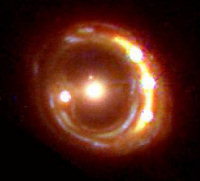- Home
- Science
- Research Groups
- Research Topics
- Annual Report
- Education
- Agenda
- Public & Media

- Contact Us
de Géophysique (Bât. B5c)
Quartier Agora
Allée du 6 août, 19C
B-4000 Liège 1 (Sart-Tilman)
Belgique
Tel.: 04.366.9779
Fax: 04.366.9729
Research Topics
Observational cosmology & quasars

Quasars are extremely luminous nuclei of galaxies. They are thus observable at very large distances, which correspond to epochs at which the Universe was much younger. The study of quasars and their host galaxies makes it possible to understand better the formation, the structure and the evolution of galaxies. The observation of quasars as sources of light also makes it possible to probe the distant Universe in particular by using gravitationally lensed objects, through the interaction of their light with hypothetical particles, or by studying the large-scale structures traced by their positions on the sky. On the basis of imagery, spectroscopy or polarimetry carried out with the most powerful telescopes, from the ground (VLT) or from space (HST, XMM-Newton, Spitzer, Herschel), observing from the X-ray region to the far infrared, researchers of the GAPHE, IFPA, OrCA and PSILab groups investigate these various topics from both the observational and theoretical points of view, trying to understand better the evolution of the Universe since its origins.



 Version française
Version française